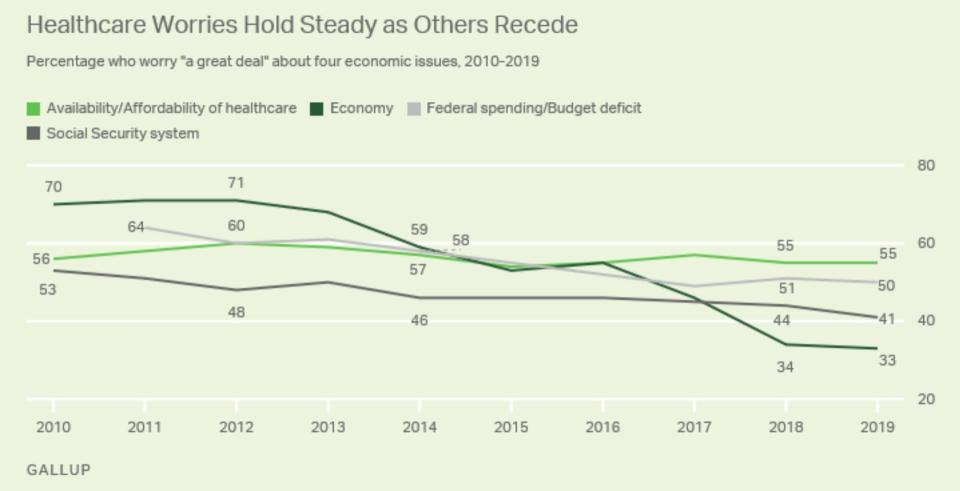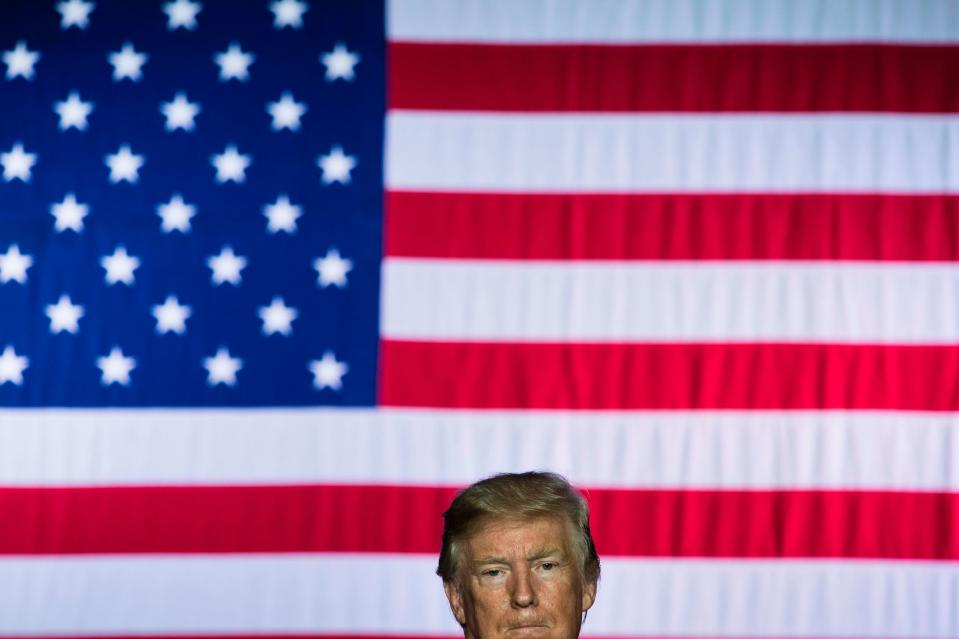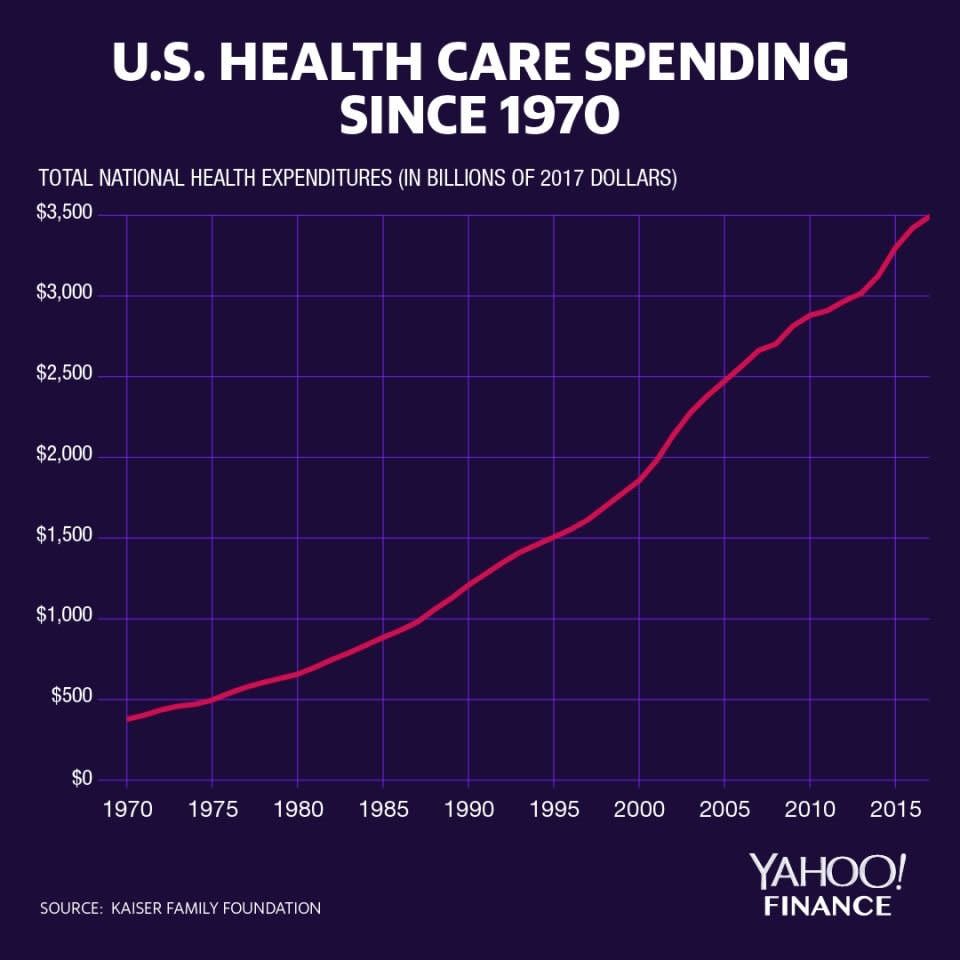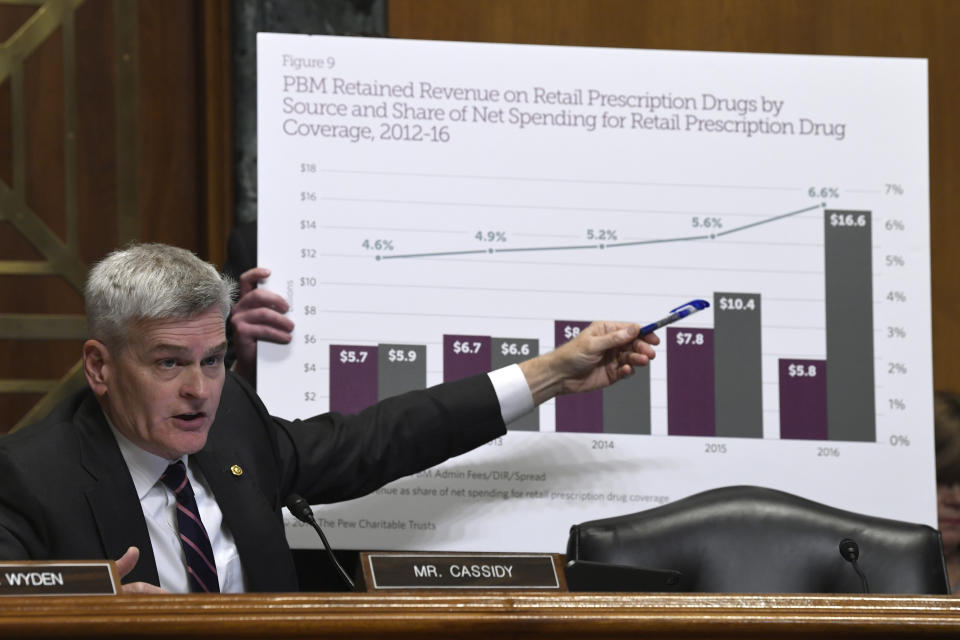As Trump waits on Obamacare, Americans list health care as top worry
While President Donald Trump and Republicans decided to wait until after 2020 to attempt Trump’s campaign promise of comprehensive health care reform, Americans remain worried as ever about the availability and affordability of health care.
Over half of the respondents surveyed in a recent Gallup poll indicated that they worry “a great deal” about the availability and affordability of health care. Health care topped Gallup's list of potentially worrisome issues for the fifth year in a row.
Out of 1,039 American adults, 55% said they worry a “Great deal” about health care affordability and health care. About 25% indicated a “Fair amount” and 21% stated only a “Little/not at all.”
According to the Gallup poll findings, “a majority of Americans have said they worry a great deal about health care in each of the 18 years the question has been asked since 2001, more than twice as often as any of the other 12 issues most often measured.”
‘The system is absolutely broken’

“We’re not surprised at all,” Frederick Isasi, executive director of Families USA, told Yahoo Finance. “We’ve been hearing a lot from our state leaders, consumer leaders, and from the public about this, and the statistics are pretty startling. Over the last 40 years, we’ve seen a six-fold increase adjusting from inflation. We’re spending six times more as a country on health care than we did 40 years ago.”
In 2017, U.S. health care spending grew 3.9%, reaching $3.5 trillion or $10,739 per person, according to the Centers for Medicaid and Medicare Services (CMS). That accounts for about 17.9% of the nation’s GDP. And the number of uninsured Americans rose from 27.5 million in 2016 to 28.9 million in 2018, according to a recent report from the Congressional Budget Office.
“We have to acknowledge that in the country right now, in the irony of it all is that we’re spending two or three times more than other wealthy nations per person for our health care,” Isasi said “Our families are struggling just to see the doctor pay for their medications. In that sense, the system is absolutely broken.”
The Affordable Care Act (ACA), signed into law in March 2010, aimed at reducing health care costs and providing health care on a national level. Nevertheless, health care worries have still remained relatively unchanged since then.
“My sense is that [the ACA] had some impact, but … not major,” David Cutler, a professor of economics at Harvard University, told Yahoo Finance. “Two sorts of people got cover: One is people who were on Medicaid, and those people really have significant needs, have their bills covered, and are probably less concerned; and then, there are the people who are in the insurance exchanges, and those folks now have insurance. They may not go bankrupt, but their deductibles are still very high.”

‘It’s not working for people the way it should’
Worry is perpetuated by uncertainty surrounding the ACA. In December 2018, a Texas judge ruled that Obamacare’s mandate was unconstitutional and agreed with the plaintiffs who argued that the lack of a penalty invalidated the “individual mandate” provision of the law. And if that part of the law were to be invalid, then the whole law would be.
Although appeals have been filed and it could take years to settle, the Trump administration has made it clear that it sides with the judge on the issue.
“The Department of Justice has determined that the district court’s comprehensive opinion came to the correct conclusion and will support it on appeal,” DOJ spokesperson Kerri Kupec said in a statement.
Trump has long made promises on health care: He vowed to repeal and replace Obamacare on his first day in office, and he tweeted on April 1: “The Republican Party will be known as the Party of Great HealtCare” [sic]. The president backed away from the topic after Senate Majority Leader Mitch McConnell said it wouldn’t happen until at least after the 2020 election.
In the meantime, Americans are turning to other means of funding their health care expenditures, such as raising money through GoFundMe. In over eight years of existence, the crowdfunding website has raised over $5 billion in donations.
In an interview with Kaiser Health News, GoFundMe CEO Rob Solomon said, “The health care system in the United States is really broken. Way too many people fall through the cracks.”
Both Cutler and Isasi agree with that sentiment.
“It’s not working for people the way it should, does it?” Cutler said. “There’s no reason why people should have to worry about an illness that’s going to put them into bankruptcy.”

‘Congress needs to step in’
While it’s easy to place the blame on one singular entity, it’s not that simple.
“We have a system of health care that has a lot of support from the government,” Isasi said. “We have things like Medicare, Medicaid, children’s insurance programs supported through the ACA, so there’s a lot of government involved in health care.”
He added that there are “also things like government-granted patents for pharmaceutical companies and device manufacturers, so a lot of this is the result of the government's involvement in health care, and the federal government needs to step in and address it.”
Two months ago, executives from some of the biggest pharmaceutical companies faced a congressional hearing, as they were grilled on their high drug prices. Senator Chuck Grassley (R-Iowa) and Amy Klobuchar (D-MN) have introduced bills aiming to lower the cost of these drugs.
“Congress needs to step in, see what’s happening in the pharmaceutical industry, and adjust the law to make sure we’re really actually getting high value and not getting ripped off,” Isasi said. “So, I think part of the blame is there.”
At the same time, he stressed, “part of the blame is absolutely also with the industry. We have to acknowledge that the men and women who are leading the health care sector — the doctors, nurses, CEOs, CFOs — are reacting to economic signals. They’re reacting to the ability they have to operate within the health care market. We have to understand some of the incentives are pretty perverse.”

‘The public wants this’
According to the Organisation for Economic Co-operation and Development, prescription drugs accounted for 17% of all health care costs in the U.S. in 2015. Average costs per person each year are about $1,200 per person, Yahoo Finance previously reported, and Commonwealth Foundation stated “that share is expected to rise over the next decade as drug costs outpace those of all other health care services.”
Cutler described health care markets as “unsure.”
“If you tell me at the moment of life and death I can charge you whatever I want, then I’ll charge you a lot of money,” he said. “Those markets are unsure. They’re not designed to be very efficient. They’re not designed to lower cost to people.”
Isasi noted the the U.S. has “done a pretty good job of figuring out where people should be getting better care,” but prices of health care continue to balloon “because of things like pharmaceuticals and the consolidation of hospitals and health systems.
“We’ve got a lot less competition so when you see [competition] dropping, you see prices going up and again, the government needs to step in,” he added. “The public wants this — Democrats, Republicans.”
READ MORE:
CEO: One key thing needs to happen before U.S. considers universal health care
America's 'inefficient' health care system is driving our fiscal instability: Powell
GoFundMe CEO: The U.S. health care system 'is really broken'
Follow Yahoo Finance on Twitter, Facebook, Instagram, Flipboard, SmartNews, LinkedIn, YouTube, and reddit.

